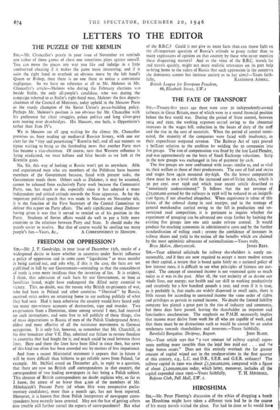THE FATE OF TRANSPORT
SIR,—Twenty-five years ago there were over 50 independently-owned railways in Great Britain, most of which were in a sound financial position before the first world war. During the period of State control, between 1914 and 1920, the working expenses soared owing to the abnormal increases in the wages bill, reduction in the hours of duty of the staff and the rise in the cost of materials. When the period of control termi- nated, the majority of the companies were faced with insolvency, as their expenditure outpaced revenue. The Railway Act of 1921 proved a brilliant solution to the problem by welding the 5o companies into five groJps. The rate of compensation was fixed by the late Lord Plender, and was approximately on the basis of Stock Exchange valuations. Scrip in the new groups was exchanged in lieu of payment by cash.
The five groups are now confronted with issues similar to, and as vital to, their welfare as those of their predecessors. The cost of fuel and stores and wages have again mounted sky-high. On the lowest computation these must be on a level with the increased cost-of-living index, which is 3o per cent. over 1938 and which your recent article described as " notoriously underestimated." It follows that the net revenue of £25,000,000 earned by the railways in 1938 will be reduced to an insignifi- cant figure, if not absorbed altogether. When cognisance is taken of this factor, of the colossal slump in coal receipts, and in the tonnage of general merchandise carried owing to the fall in production and un- restricted road competition, it is pertinent to inquire whether the experiment of grouping can be advanced one stage farther by knitting the existing five groups into one unit under private control. It would produce far-reaching economies in administrative costs and by the further standardisation of rolling stock ; restore the confidence of investors in railway shares and yield to the nation all the benefits which are claimed by the most optimistic advocates of nationalisation.—Yours truly,


































 Previous page
Previous page